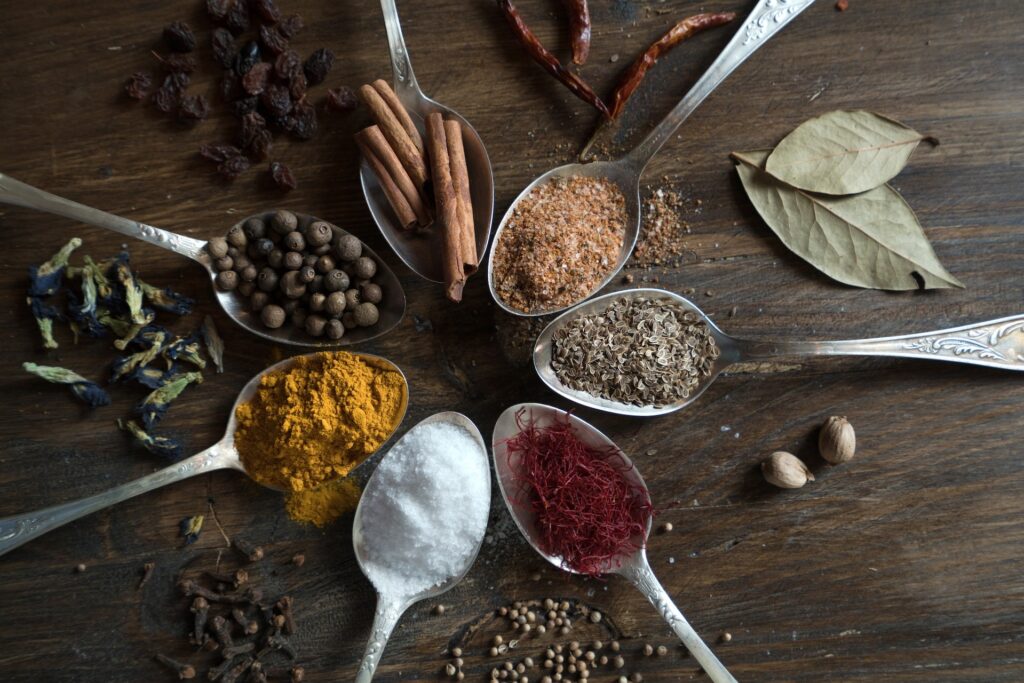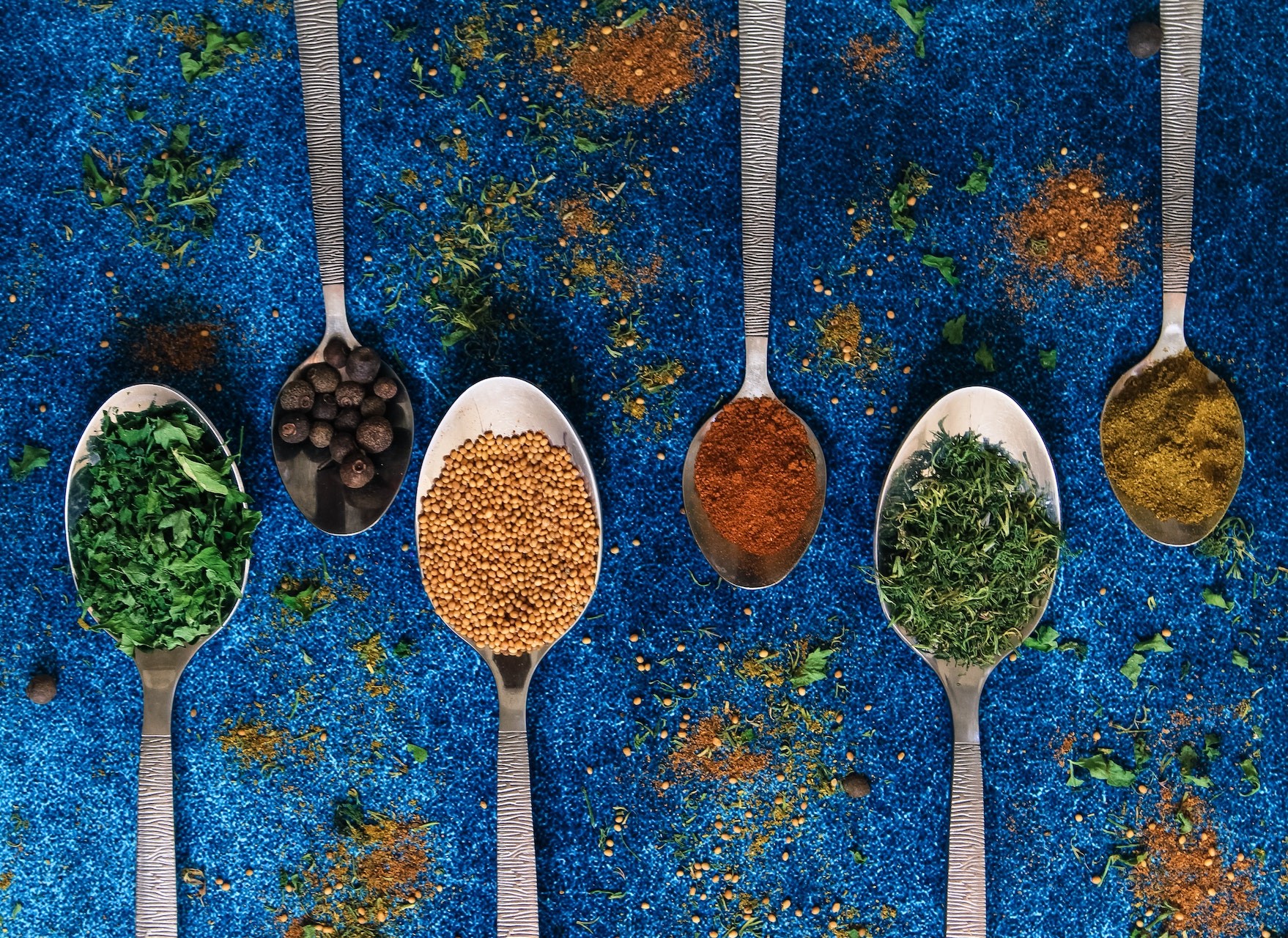Are there any herbs and spices good for diabetes? With all the dietary requirements and self-care needs for managing your blood sugar, having diabetes may seem like a daily battle. Research is beginning to show that certain popular herbs and spices have properties that increase insulin sensitivity, regulate blood sugar levels, reduce inflammation, provide antioxidants, and promote overall health.
The advantages of some of the finest herbs and spices good for diabetes are listed below. As well as how to use them to improve your diabetes management.
List of the Herbs and Spices Good for Diabetes

🍂Green Tea
Green tea contains antioxidants and other beneficial compounds, making it one of the best herbs and spices for diabetes management. Studies have shown that green tea can help reduce blood sugar levels, lower cholesterol levels, and protect against heart disease. Drinking two cups of green tea daily is recommended for all its benefits. Alternatively, you can supplement with green tea extract capsules if you don’t like drinking them daily.
🍂Aloe Vera
Aloe vera can improve insulin sensitivity, lowering cholesterol, and decrease blood sugar levels. It is also rich in vitamins that can enhance your overall health. You can even make aloe vera juice at home using fresh aloe leaves.
🍂Bitter Melon
Bitter melon is a fruit native to South Asia that has long been used as an herbal remedy for various health problems, including diabetes. Studies have shown that bitter melon helps reduce blood sugar levels, lowers cholesterol levels, increases insulin sensitivity, and protects against oxidative damage caused by free radicals in the body. To get the maximum benefits from bitter melon, you should eat it raw or cooked – whatever you prefer.
🍂Milk thistle
Milk thistle has been used for centuries as an herbal remedy for a variety of conditions, including diabetes. It contains powerful antioxidants known as silymarin which help protect against oxidative damage caused by free radicals in the body; this helps reduce inflammation associated with diabetes and improves overall health and wellness. Additionally, milk thistle may help improve liver function by aiding in detoxification processes; this helps balance hormones, which may benefit those living with diabetes. Taking milk thistle supplements or adding it to meals are great ways to get all its benefits!
🍂Turmeric
This popular spice has been used since ancient times as an herbal remedy for various ailments such as arthritis pain relief and skin infections; more recently, however, studies have shown that it may be beneficial in managing diabetes too! Turmeric contains curcumin which helps regulate blood sugar levels; this helps reduce inflammation associated with uncontrolled blood sugars, which can lead to complications such as heart disease over time if left unchecked.
Turmeric also has strong antioxidant properties, which further aid in reducing inflammation throughout the body – something those living with diabetes should pay particular attention to! Adding turmeric powder or capsules into meals or smoothies are great ways to reap all its benefits!
🍂Gymnema
Gymnema sylvestre is an herb native to India proven to help control blood sugar levels and aid in weight loss. Gymnema contains gymnemic acids, which act as natural insulin in the body and block the absorption of sugars from food. Studies have also shown that Gymnema helps reduce cravings for sweets, making it a great choice for people with diabetes trying to regulate their blood sugar levels. Gymnema is best taken as a supplement or tea but can also be added to foods like smoothies or oatmeal.
🍂Dill
Dill is an herb commonly used in cooking but has several health benefits. Dill helps reduce inflammation, lowers cholesterol and stress levels, and even aids digestion due to its high fiber content. When ingested consistently, it can drop blood sugar levels. Dill can be enjoyed fresh or dried as an ingredient in recipes or steeped as tea.
🍂Fenugreek
Fenugreek is another common herb found to help lower blood sugar levels in people with diabetes by increasing insulin sensitivity and improving glucose tolerance. Fenugreek can be eaten raw or cooked into dishes like curries, soups, stews, salads, and more! It can also be taken as a supplement or brewed into a tea for convenience and ease of use.
🍂Ginger
Ginger is an extremely popular spice that adds flavor to dishes and provides many health benefits, such as reducing inflammation, aiding digestion, relieving nausea, and boosting immunity—all essential factors for managing diabetes effectively! Ginger may also help reduce fasting blood sugar levels when taken daily over time, so adding it to your diet regularly could do you some good! You should peel fresh ginger before using; try grating it into stir-fries or adding it to smoothies for an extra kick!
🍂Cinnamon
Cinnamon has been found to help lower blood sugar levels by improving insulin sensitivity which means consuming cinnamon could help keep your diabetes under control! You can sprinkle cinnamon onto oatmeal, yogurt bowls, or smoothies. Add into baking recipes like muffins; blended into lattes; steeped into tea; or even made into delicious desserts like cinnamon rolls.
🍂Chamomile
Studies have shown that chamomile can help reduce blood sugar levels, making it an ideal choice for those with diabetes. To get the most out of this herb, add a few tablespoons of dried chamomile flowers to a cup of hot water and sip on the herbal tea throughout the day.
🍂Curry Leaves
These are another popular herbs used to treat diabetes. The leaves contain compounds that help regulate insulin levels, making them beneficial for those with type 2 diabetes. To reap the benefits of curry leaves, add a few fresh leaves to your daily diet, steep them in hot water, and drink the tea several times a week.
🍂Jambu Fruit
It is native to South America but has recently become popular among those looking for natural ways to manage their diabetes symptoms. The fruit contains compounds that lower blood glucose levels and help stabilize insulin levels in diabetics. To use jambu fruit for diabetes management, try adding fresh or dried pieces of fruit to salads or smoothies daily or drinking jambu juice twice weekly.
🍂Basil
Basil is also known for its anti-diabetic properties; studies have shown that basil helps lower blood glucose levels by improving insulin secretion and sensitivity. To get the most out of basil, add it fresh to salads or other dishes daily, or try drinking several cups of basil tea weekly.
🍂Bilberry
This herb is known for its anti-diabetic effects; studies have found that bilberry extracts can help increase insulin sensitivity in diabetics while lowering their fasting blood glucose levels. To take advantage of bilberry’s benefits, try adding one teaspoon of dried bilberry extract powder into smoothies daily or drinking several cups of bilberry tea weekly.
🍂Cumin
Cumin is a widely used spice in different cultures around the world. Especially in Mexico and India. It can assist those with type 2 diabetes in controlling their levels of blood sugar. Studies suggest that taking 1 teaspoon of cumin powder twice daily can lower fasting blood glucose levels by up to 17%.
Cumin is also well known for having anti-inflammatory capabilities. Which may help lessen diabetes-related inflammation. Add it to savory dishes like soups and stews, or sprinkle it on roasted vegetables to get the most out of cumin.
🍂Dandelion
Dandelion has anti-diabetic effects due to its ability to regulate blood sugar levels. Studies show that dandelion extract improves insulin sensitivity in diabetic rats. Without having to consume the herb directly, dandelion tea is an excellent method to get its advantages. It only takes 10 minutes to soak 2 tablespoons of dried dandelion leaves in heated water before filtering and sipping. You can also add dried dandelion leaves or flowers into salads or soups for extra flavor and nutrition.
🍂Garlic
Did you know that Garlic can help manage diabetes? Garlic contains allicin and alliin which can lower blood sugar levels in both type 1 diabetics and those with pre-diabetes. To take advantage of garlic’s anti-diabetic effects, add it generously to your cooking. Or take a garlic supplement daily (under the guidance of your doctor).
🍂Tarragon
It contains an active compound called eugenol which helps lower glucose levels in the blood. Well recognized for having anti-inflammatory effects, tarragon is a great addition to recipes for diabetics. Add some fresh tarragon to salads or sauces for a delicious flavor boost!
🍂Stevia
Stevia effectively reduces blood sugar levels due to its low glycemic index (GI) value. Additionally, it contains compounds such as polyphenols which may help prevent cell damage caused by high blood sugar levels. Use stevia as a substitute for sugar when baking or cooking to control your blood sugar levels.
🍂Sage
Studies have shown that sage helps reduce blood glucose levels. Significantly when taken in medicinal doses over time. You can add fresh or dried sage leaves to your favorite dishes. Or make tea by steeping 1 tsp of dried sage leaves in hot water for 10 minutes before drinking it 3 times daily.
🍂Rosemary
Rosemary has powerful antioxidant properties which can help protect against cell damage caused by high blood sugar levels. It also helps reduce inflammation associated with type 2 diabetes and other chronic diseases. Add some fresh rosemary leaves into soups and stews, or sprinkle some dried rosemary onto roasted vegetables!
🍂Peppermint
Another herb that can aid in improving diabetes management is peppermint! It contains menthol, which helps relax the digestive tract muscles and improves digestion. Thus leading to better glycemic control over time. You can enjoy peppermint tea as part of your morning routine or add it to recipes such as salads or smoothies for added flavor!
Final Words
With proper moderation and knowledge of which herbs and spices are good for diabetes. One can maintain healthy blood sugar levels over time while enjoying delicious meals. Above all else, it is important to remember that technological advances have played a vital role in helping us understand how herbs and spices work for diabetes. Thus, continued research into the effects of herbs and spices on diabetes may soon improve the lives of millions living with this condition.

